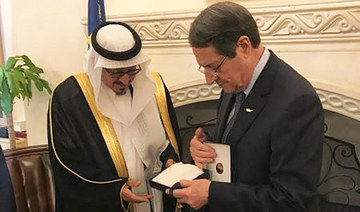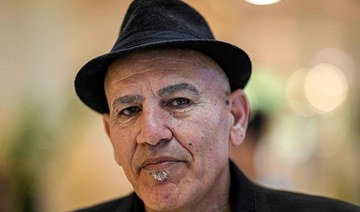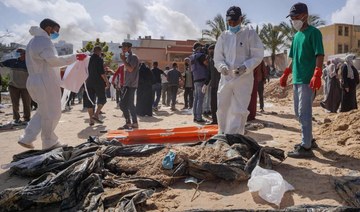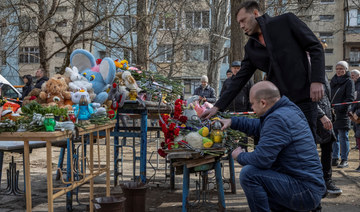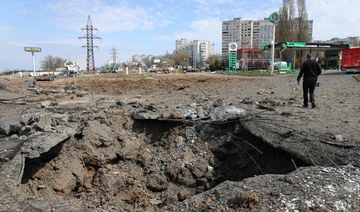NICOSIA: Dairy farmers on Cyprus refer to halloumi as “white gold.” The salty, rubbery cheese made from goats’ and sheep’s milk and prized for its ability to withstand a grill without melting is the country’s leading export.
Cypriot authorities have spent years trying to get the European Union to recognize halloumi, or hellim in Turkish, as a traditional product of the east Mediterranean island nation. Receiving the EU’s top quality mark — the “Protected Designation of Origin” — would mean only halloumi made in Cyprus could be marketed abroad under that name.
The nation’s farmers and producers want the Cyprus-specific designation to keep makers of inferior cheeses in other countries from claiming a slice of their market of over 200 million euros ($222 million). Cypriot producers say demand from overseas is projected to hit new highs in the next few years, thanks to heat-tolerant halloumi’s growing popularity as a meat alternative.
However, ethnically divided Cyprus’ complex politics so far have stymied the bid to protect the halloumi name. The difficulty lies in a dispute over how to lawfully get cheese made in the country’s breakaway northern third to foreign markets. The self-declared Turkish Cypriot state is recognized only by Turkey and goods produced there cannot be exported directly.
Cyprus was split along ethnic lines in 1974 when Turkey invaded in the wake of a coup by supporters of union with Greece. The country joined the EU in 2004, but EU rules and regulations only apply to the southern, Greek Cypriot part of the island led by an internationally recognized government.
A European Parliament member from Cyprus has accused the EU’s executive commission of letting the PDO application for halloumi grow moldy. The government hopes the new European Commission seated last month will find a way around the quandary.
Halloumi/hellim was put on track for an exclusive geographic designation amid much fanfare in 2015, when relaunched negotiations between the rival Greek Cypriot and Turkish Cypriot leaders brimmed with hope of delivering a deal to reunify the island as a two-zone federation.
A compromise was struck for the Bureau V eritas — a European body that certifies food and agricultural products — t o perform checks on halloumi/hellim produced on both sides of the ethnic divide to ensure it met EU health and safety standards.
But the peace talks eventually collapsed, and the application has languished since then.
The Cypriot government says the agreement foresaw the export to European markets of vetted, Turkish Cypriot-produced cheese through EU-recognized ports in the south. Britain, Sweden and Germany currently are the top three markets for Cyprus’ halloumi.
But Turkish Cypriot authorities say there was no such understanding. They accuse Greek Cypriots of blocking the European Commission’s effort to enable halloumi/hellim exports from the island’s north.
“Turkish Cypriot producers should be able to export PDO-registered hellim/halloumi as they deem viable,” Turkish Cypriot Chamber of Commerce President Turgay Deniz said. “They should not be restricted to trading across (the dividing line) and via the ports in the south.”
According to Deniz, 13 Turkish Cypriot halloumi/hellim producers export around 30 million euros ($33 million) worth of the cheese to Turkey and Gulf countries. The cheese reaches Gulf nations through Turkey.
Cyprus’ Agriculture Ministry says it intends to keep pushing to clinch the exclusive mark and “to solve soon the remaining issues relating to the registration of halloumi/hellim for the benefit of all Cypriot producers.”
The European Commission says it’s in contact with the Cypriot government and Turkish Cypriots to “ensure an outcome.”
But Cypriot European Parliament member, Costas Mavrides, alleges the Commission is “arbitrarily” stalling it’s approval for halloumi to get the PDO. He said there’s no legal reason for the cheese not to gain the designation and that the only step that’s left is the green light from the Commission.
Mavrides is urging the Cypriot government to take the matter to the EU Court of Justice so halloumi/hellim gets the coveted moniker.
Farmers’ organizations fully back the government’s PDO drive for halloumi. But curiously, a segment of the cheese-making community is voicing its dissent at the cheese clinching the designation amid concerns that this could lead to job losses and shrinking revenue.
For halloumi/hellim t o secure the designation, it must conform to a Cyprus government directive that it must contain at least 51% sheep’s and goats’ milk. That’s in line with a traditional Cypriot recipe dating back some 500 years when cows were a rare commodity. Now, the cheese is made with mostly cow’s’ milk.
But Cheesemakers’ Association President George Petrou warns that more than one-third of the 13,000 Cypriot families in the halloumi/hellim business would find themselves out of a job if they couldn’t use as much cows’ milk in their cheese.
Cheese exports would drop by at least half, as production would plummet because of a current shortage of sheep and goat milk, Petrou estimated.
Petrou says cheese-makers instead want authorities to pursue a geographical origin designation whose rules are more flexible on how much cow milk can be used.
“As cheese-makers, we want a solution that won’t reduce exports or lead to job losses,” Petrou told The Associated Press.
Other industry groups see holes in that argument. Rejecting the idea of using less cows’ milk loses sight of the long-term benefits that a PDO mark would offer Cypriot halloumi makers, says Michalis Lytras, president of the Pancyprian Farmers’ Union.
The geographic designation would protect local producers from foreign competitors who might use cheaper, possibly government-subsidized cow milk to make halloumi/hellim.
A PDO designation wouldn’t preclude finding solutions addressing cheesemakers’ concerns, like possibly marketing halloumi/hellim made with mostly cow milk under a different name.
“We can’t sacrifice those long-term benefits for short-term gains,” said Lytras.
Takis Christodoulou, president of the New Farmers’ Movement, says the high sheep and goat milk content appeals to health-conscious European consumers who are helping to fuel halloumi sales.
Christodoulou disputes that revenue from halloumi/hellim exports would drop as steeply as Petrou contends. He said while there may be a dip in cheese exports, PDO-designated halloumi/hellim would command higher prices in foreign markets.
“This is the natural product of Cyprus, and we couldn’t be prouder of it,” said Christodoulou.
White gold: Cyprus’ halloumi cheese entangled in politics
https://arab.news/yt7y4
White gold: Cyprus’ halloumi cheese entangled in politics
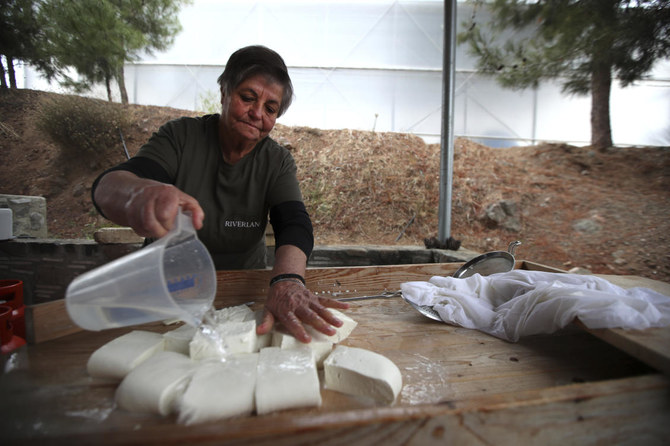
- Cypriot authorities have spent years trying to get the EU to recognize halloumi as a traditional product of the east Mediterranean island nation
Major arrests at NYU campus as Gaza protests spread
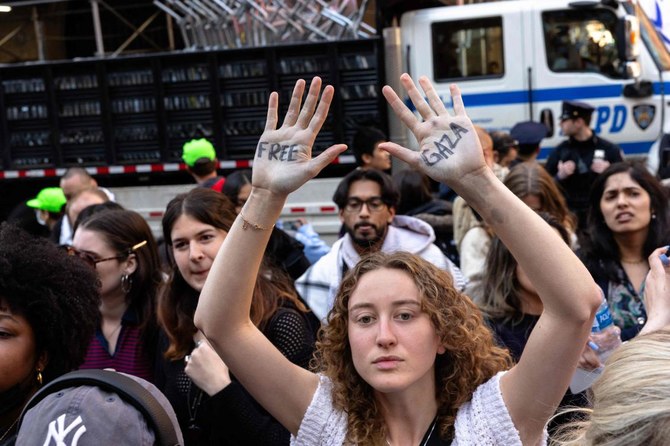
- Some of America’s most prestigious universities have been rocked by protests in recent weeks
- On Tuesday, the New York Police Department said 133 people had been arrested at NYU and released after being issued with court summons
NEW YORK: More than 130 people were arrested overnight during pro-Palestinian protests at the New York University campus, as student demonstrations gather pace in the United States over the Israel-Hamas war.
Some of America’s most prestigious universities have been rocked by protests in recent weeks as students and other agitators take over quads and disrupt campus activities.
The demonstrations come amid sweeping debates over Israel’s assault on Gaza, following Hamas’s deadly invasion on October 7.
Such bastions of higher education — Harvard, Yale, Columbia and others — are grappling for a balance between students demanding free speech rights and others who argue that campuses are encouraging intimidation and hate speech.
On Tuesday, the New York Police Department told AFP that 133 people had been arrested at NYU and released after being issued with court summons, as protests also intensify at Yale, Columbia University and other campuses.
As the holiday of Passover began Monday night, police began detaining demonstrators at an encampment at NYU who had earlier refused orders to disperse.
A New York University spokesman said the decision to call police came after additional protesters, many of whom were not thought to be affiliated with NYU, suddenly breached the barriers erected around the encampment.
This “dramatically changed” the situation, the spokesman said in a statement on the school’s website Monday, citing “disorderly, disruptive and antagonizing behavior” along with “intimidated chants and several antisemitic incidents.”
“Given the foregoing and the safety issues raised by the breach, we asked for assistance from the NYPD. The police urged those on the plaza to leave peacefully, but ultimately made a number of arrests.”
The spokesman said the school continues to support freedom of expression and the safety of students.
But protests have grown large and disruptive enough — New York Police Department spokesmen have spoken of their officers facing violence when confronting protesters at NYU — to draw the attention of President Joe Biden and his administration.
“Anti-Semitic hate on college campuses is unacceptable,” US Secretary of Education Miguel Cardona posted on X on Tuesday, expressing concern about the unrest.
The protests began last week at Columbia University, also in New York, with a large group of demonstrators establishing a so-called “Gaza Solidarity Encampment” on school grounds.
But more than 100 protesters were arrested after university authorities called the police onto Columbia’s campus Thursday, a move that seemingly escalated tensions and sparked a greater turnout over the weekend.
Social media images late Monday appeared to show pro-Palestinian Jewish students holding traditional seder meals inside the protest areas on campuses including at Columbia.
There were also demonstrations at MIT, the University of Michigan, UC Berkeley and Yale, where at least 47 people were arrested Monday after refusing requests to disperse.
France arrests eight in PKK financing probe
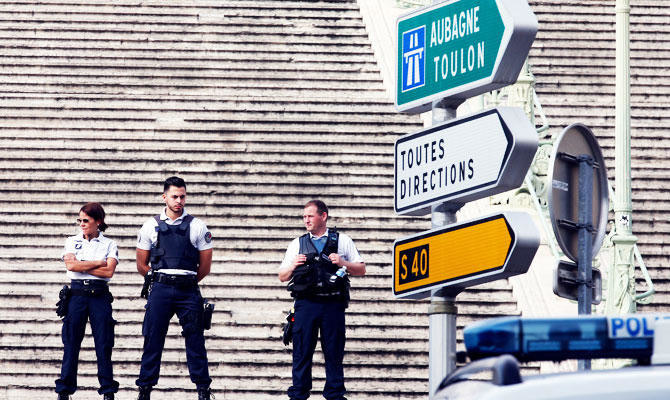
- The arrests took place in the Paris region and in southern France, the PNAT anti-terror unit said
- French prosecutors suspect the eight of preparing and financing terrorist acts
PARIS: French police arrested eight men on Tuesday as part of an investigation into the finances of the Kurdistan Workers Party (PKK), banned as a terror organization by Turkiye and its Western allies, anti-terrorism prosecutors told AFP.
The arrests took place in the Paris region and in southern France, the PNAT anti-terror unit said.
The PKK has been designated a terrorist organization by Turkiye, the United States and the European Union.
French prosecutors suspect the eight of preparing and financing terrorist acts, and of conspiring to extort, or attempt to extort, funds to finance a terrorist organistion between 2020 and 2024, the PNAT said.
Investigators believe the eight to be connected to a campaign to collect funds from Kurdish business people and other Kurds in France, a source close to the case added.
Police can hold the suspects for up to 96 hours for questioning, the source said.
Another source said the funds were destined for use in Belgium, where police on Monday raided Kurdish-run media as part of a probe undertaken at the request of a French anti-terror judge, the PNAT said.
The PKK has waged a decades-long insurgency for greater autonomy for the Kurdish minority of Turkiye in the southeast of the country, in a standoff with the Ankara government that remains unresolved to this day.
Dutch intelligence sees the wars in Gaza and Ukraine as triggers for terrorist threats
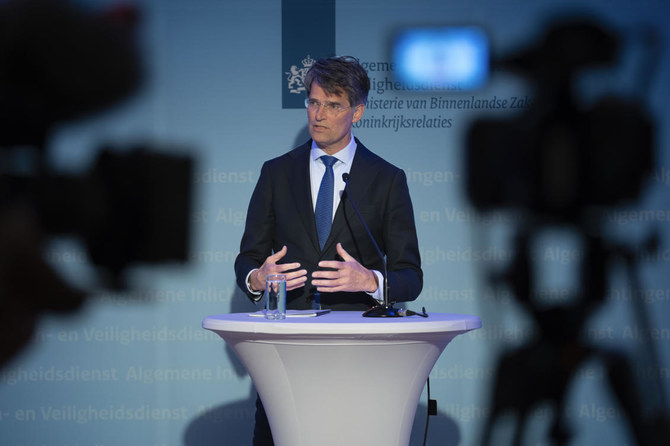
- The Israel-Hamas war in Gaza and the destruction of a Qur’an outside parliament last year are “trigger events” for extremists
- “The terrorist threat is serious at this moment,” the agency’s director-general, Erik Akerboom, told AP
ZOETERMEER, Netherlands: The Dutch national intelligence agency said Tuesday that threats targeting the Netherlands are increasingly connected to worldwide turmoil, including the wars in Gaza and Ukraine.
Although the number of terror attacks across Europe has been down in recent years, the General Intelligence and Security Service in its annual report said the Israel-Hamas war in Gaza and the destruction of a Qur’an outside parliament last year are “trigger events” for extremists.
“The terrorist threat is serious at this moment,” the agency’s director-general, Erik Akerboom, told The Associated Press.
Akerboom said he is particularly concerned about big events, noting that the agency is working closely with French authorities to prevent incidents during the Paris Olympics this summer.
In December, the Dutch counterterrorism agency increased the country’s threat alert to its second-highest level because of concerns about the Daesh group’s Khorasan affiliates, Akerboom said. IS-K, a Central Asian affiliate, was responsible for the attack at a suburban Moscow concert hall that killed at least 133 people in March.
According to the new report, “global jihadism has been the greatest terrorist threat for years in the Netherlands.” Incidents such as the one last April, when an anti-Islam activist tore pages from the Qur’an in front of the Dutch parliament building, put the Netherlands on the map of targets.
About a dozen terror attacks were thwarted by authorities in Europe last year and in four cases, suspects were arrested in the Netherlands, the report said. None of those attacks was focused on the Netherlands, according to Akerboom.
The Dutch also see threats from China, in particular cyberattacks, as a major concern. Akerboom said China is producing more hackers to break into Dutch systems than the Dutch can produce to defend them. The security service has cited China as the biggest threat to the country’s economic security.
Russia also continues to pose a risk to the Netherlands amid Moscow’s full-scale invasion of Ukraine. So-called peace protests in Amsterdam which call for the Dutch to stop sending arms to Ukraine have included demonstrators paid by Russian sources to attend and given prefabricated slogans, the security service has asserted.
The Netherlands is of particular interest to Moscow in part because of the international institutions housed here, including the International Criminal Court. The Hague-based court is investigating crimes in Ukraine and has issued arrest warrants for President Vladimir Putin and other Russians.
Sunak says UK to raise defense spending amid global threats
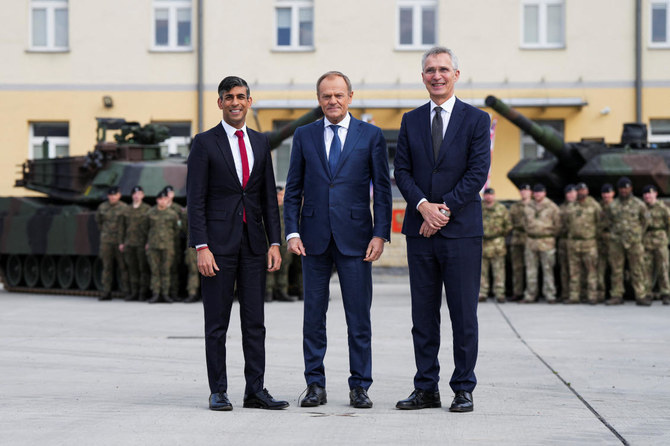
- “In a world that is the most dangerous it has been since the end of the Cold War, we cannot be complacent,” Sunak told reporters
- The increase in spending from 2.3 percent will see the UK become one of the highest spenders on defense in the 32-member defense alliance
WARSAW: Britain will raise defense spending to 2.5 percent of GDP by 2030 in a “most dangerous” world, Prime Minister Rishi Sunak said Tuesday during a visit to Poland.
The commitment came as NATO countries face pressure to raise defense spending in the face of global threats, particularly from Russia.
“In a world that is the most dangerous it has been since the end of the Cold War, we cannot be complacent,” Sunak told reporters in Warsaw, where he held a press conference with NATO Secretary-General Jens Stoltenberg.
The increase in spending from 2.3 percent will see the UK become one of the highest spenders on defense in the 32-member defense alliance after the United States, the British government said.
It means the UK is expected to spend £87 billion on defense in 2030-31, an increase of £23 billion over current levels.
“I believe we must do more to defend our country, our interests, and our values,” Sunak said, announcing “the biggest strengthening of national defense for a generation.”
Western nations are under pressure to boost defense funding following Moscow’s invasion of its neighbor Ukraine as well as the threat of escalation in the Middle East.
EU chief Ursula von der Leyen recently called for a “European awakening on defense and security.”
Brussels is set to come up with more proposals for financing the defense push by a summit of EU leaders in June.
Sunak has also faced calls from his Conservative Party to boost defense spending, with some calling for a level of three percent of GDP.
On Tuesday, Sunak also announced £500 million additional funding for Ukraine’s war effort against Russia.
A Russian strike on Kharkiv’s TV tower is part of an intimidation campaign, Ukraine’s Zelensky says

- Kharkiv region straddles the approximately 1,000-kilometer front line where Ukrainian and Russian forces have been locked in battle for more than two years
- “Four priorities are key: defense of the sky, modern artillery, long-range capacity, and to ensure that packages of American aid arrive as soon as possible,” Zelensky said
KYIV: Ukrainian President Volodymyr Zelensky said a Russian missile strike that smashed a prominent skyline television tower in Kharkiv was part of the Kremlin’s effort to intimidate Ukraine’s second-largest city, which in recent weeks has come under increasingly frequent attack.
The strike sought to “make the terror visible to the whole city and to try to limit Kharkiv’s connection and access to information,” Zelensky said in a Monday evening address.
The northeastern Kharkiv region straddles the approximately 1,000-kilometer (600-mile) front line where Ukrainian and Russian forces have been locked in battle for more than two years since Moscow’s full-scale invasion of Ukraine. The front line has changed little during a war of attrition, focused mostly on artillery, drones and trenches.
Since late March, Russia has stepped up the pressure on Kharkiv, apparently aiming to exploit Ukraine’s shortage of air defense systems. It has pounded the local power grid and hit apartment blocks.
On Monday, a Russian Kh-59 missile struck Kharkiv’s 250-meter (820-foot) -high TV tower, breaking it roughly in half and halting transmissions.
A Washington think tank said Russia may be eyeing a ground assault on Kharkiv.
“The Kremlin is conducting a concerted air and information operation to destroy Kharkiv City, convince Ukrainians to flee, and internally displace millions of Ukrainians ahead of a possible future Russian offensive operation against the city or elsewhere in Ukraine,” the Institute for the Study of War said in an assessment.
The expected arrival in Ukraine in coming weeks of new military aid from its Western partners possibly has prompted Russia to escalate its attacks before the help arrives, the ISW said, adding that trying to capture Kharkiv would be “a significant challenge” for the Kremlin’s forces.
Instead, the Russian military command “may attempt to destroy Kharkiv City with air, missile, and drone strikes and prompt a large-scale internal displacement of Ukrainian civilians,” it said.
The US Senate was returning to Washington on Tuesday to vote on $61 billion in war aid to Ukraine after months of delays. Zelensky said US President Joe Biden assured him the aid would include long-range and artillery capabilities.
“Four priorities are key: defense of the sky, modern artillery, long-range capacity, and to ensure that packages of American aid arrive as soon as possible,” Zelensky said.
Also Tuesday, Britain pledged 500 million pounds ($620 million, 580 million euros) in new military supplies for Ukraine, including 400 vehicles, 60 boats, 1,600 munitions and 4 million rounds of ammunition.
The shipment will also include British Storm Shadow long-range missiles, which have a range of about 150 miles (240 kilometers) and have proven effective at hitting Russian targets, the British government said.
British Prime Minister Rishi Sunak spoke with Zelensky on Tuesday morning to confirm the new assistance. He was due to announce the aid later Tuesday during a visit to Warsaw where he was meeting with Polish Prime Minister Donald Tusk and NATO Secretary General Jens Stoltenberg.
Less cheering news came from the European Union, however. EU countries that have Patriot air defense systems gave no clear sign Monday that they might be willing to send them to Ukraine, which is desperately seeking at least seven of the missile batteries.
Ukraine’s army is also heavily outnumbered in the fight, and expanding the country’s mobilization has been a delicate issue.
Ukrainian Foreign Minister Dmytro Kuleba on Tuesday signaled that authorities plan to clamp down on young men of conscription age who have moved abroad, with details of the specific measures to be made public soon.
“Staying abroad does not relieve a citizen of his or her duties to the homeland,” Kuleba said on the social media platform X.
Meanwhile, Russia launched 16 Shahed drones and two Iskander-M ballistic missiles over Ukraine’s southern and central regions, the Ukrainian air force said Tuesday morning. It said all but one of the drones were intercepted.
In Odesa, an overnight attack injured nine people, regional Gov. Oleh Kiper said. Among those injured were two infants and two children aged nine and 12, Kiper said. City mayor Hennadii Trukhanov said 58 apartments in 22 buildings were damaged.
In other developments:
A Russian missile strike near Dnipro, Ukraine’s fourth-largest city, injured four people who were admitted to hospital, regional Gov. Serhii Lysak said.
Russian forces dropped a guided aerial bomb in Kostiantynivka, a city in the eastern Donetsk region, injuring five people who were riding in a car, police said. Two of them were in critical conditions.






